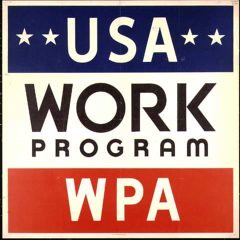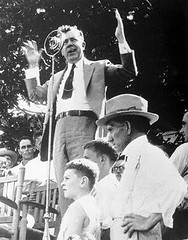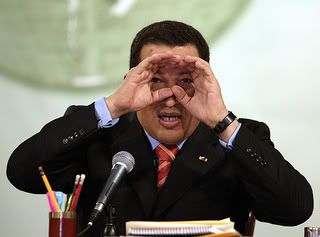 There has been much talk lately about the Great Depression, how it parallels our current economic crisis, and how passage of the New Deal might serve as a model for the Democrats and the new Obama administration in their attempts to rescue the economy.
There has been much talk lately about the Great Depression, how it parallels our current economic crisis, and how passage of the New Deal might serve as a model for the Democrats and the new Obama administration in their attempts to rescue the economy.
But it is how the passage of the New Deal may serve as a model for the Progressive movement that I want to discuss here. For, as I will demonstrate, if it were not for the Progressive movement, and Roosevelt’s harshest critics from the left, we would have ended up with a very different New Deal – one which, arguably, would not have been much of a deal at all.
In what I like to call the Children’s History of America, FDR, elected on a reform agenda, swept into office and, within his first one hundred days, passed a bunch of bills that are known as the New Deal. Consequently, as the story goes, millions of people returned to work, the economy eventually recovered, and a new era of social security was ushered in that would last for decades. But this history is false. In fact, one cannot understand the passage of the New Deal, or FDR’s first term, without giving full consideration to the forces that rose up against him from the progressive, populist, and very angry left. For those forces did more to shape the New Deal, and ensure its success, than any other factor.
If you’re not a historian, chances are you don’t know that there was essentially a second New Deal – the sweeping set of programs enacted in 1935 – after the 1934 midterms and before FDR’s 1936 reelection campaign. Many historians even refer to this period as the Second 100 Days. In the children’s history, you don’t hear much about the “Second New Deal”. That’s a shame, for it was this set of legislative accomplishments that actually, more than any other, constituted what would be known as the New Deal. It is this set of programs that changed the country. Here is a partial list:
- Emergency Relief Appropriation Act
- Public Works Administration (PWA)
- Works Progress Administration (WPA)
- Formation of National Labor Relations Board (NLRB)
- The Wagner Act
- Public Utility Holding Company Act
- Social Security Act
These programs, to a large degree, were the New Deal. The Emergency Relief Appropriation Act, along with the PWA and WPA created the government works program which eventually put over 10 million people to work.
The NRLB and Wagner Act effectively created organized labor by ensuring, among other things, the right to unionize and to bargain collectively with employers.
The Public Utilities Holding Company Act broke up the utility monopolies and ensured local ownership of public utilities. This was no small deal. Until its partial repeal in 1993 under Clinton, which directly led to the Enron fiascoes in California, and its full repeal in 2005, the PUHCA had maintained a tightly regulated, highly stable system of energy delivery for seventy years.
And then there’s the Social Security Act. No other program of the New Deal has had a more enduring impact and affected more lives. Yet it’s easy to forget just how radical this idea was in the 1930s. Roosevelt actually opposed it as too costly and opted for just the unemployment insurance part.(1) But, as it was in 1935, politicians were going along with a lot of things they had originally opposed.
“The Populist Uprising “
 By the spring of 1935, the New Deal was a failure. Not that some of the measures enacted in the first 100 days hadn’t helped. The economy had grown a little bit. Businesses started to feel a bit more confident. And a couple million people had gone back to work. But after two years recovery began to falter – the country was still in a depression and approximately 1/5th of the workforce was still unemployed. And to make matters worse, the Supreme Court had declared by unanimous consent that Roosevelt’s flagship program, the National Industrial Recovery Act, was unconstitutional. This was a devastating blow – the NIRA was not just another remedial government program. It was the remedial government program, a massive, very high profile national campaign that included a PR blitz, celebrity endorsements, and even a logo business participants could put in their windows. The administration had practically bet the farm on the NIRA and now it was dead.
By the spring of 1935, the New Deal was a failure. Not that some of the measures enacted in the first 100 days hadn’t helped. The economy had grown a little bit. Businesses started to feel a bit more confident. And a couple million people had gone back to work. But after two years recovery began to falter – the country was still in a depression and approximately 1/5th of the workforce was still unemployed. And to make matters worse, the Supreme Court had declared by unanimous consent that Roosevelt’s flagship program, the National Industrial Recovery Act, was unconstitutional. This was a devastating blow – the NIRA was not just another remedial government program. It was the remedial government program, a massive, very high profile national campaign that included a PR blitz, celebrity endorsements, and even a logo business participants could put in their windows. The administration had practically bet the farm on the NIRA and now it was dead.
But the Court was the least of Roosevelt’s problems that year. Public dissatisfaction with the lack of progress on the economy was reaching a fevered pitch. It appeared, from all sides, FDR was under siege.
The Hooverites and business leaders had opposed the New Deal from inception and thought Roosevelt had gone too far in his first hundred days. Many in High Society refused to even mention FDR’s name. (I don’t mean they wouldn’t talk about him. I mean they deliberately made a point of referring to him without mentioning his name.) But the real threat to FDR was from his own left flank. The Progressives, both Democrat and Republican, were deeply dissatisfied and thought FDR hadn’t gone far enough. They also believed he was far to favorable to the oligarchs, despite his having fallen from their graces.
There were others too, outspoken critics, often referred to as the demagogues, who, by late 1935 had grown so dissatisfied with FDR that they began to plot a third party run in the upcoming 1936 election. They too believed the New Deal was too protective of the banking interests and the wealthy and didn’t go far enough to help the poor. These included Father Charles Coughlin, an anti-Semite who railed against the bankers and the Jews, but none the less built up a following of as many as 40 million listeners to his radio show. He advocated nationalizing the banks and abolishing the Federal Reserve. And Dr. Francis Townsend, who advocated providing the elderly with a $200 a month income, had grown widely popular by mid-thirties.
Another threat to FDR was, and one that particularly caught his attention, was the a new progressive alliance in Wisconsin. Long a hotbed of progressive sentiments, Wisconsin had just elected a progressive Governor who actually ran as a “radical” telling voters, “I am not a liberal, I am what I want to be – I am a radical.” In the 1930 race for Wisconsin’s governor, Olson actually defeated his Republican opponent by an astounding 200,000 votes. Once in office, he introduced such progressive reforms as a progressive income tax, public unemployment insurance, and old age pensions. In 1935, he vowed to run against FDR unless he produced a more radical New Deal.
 But it was Huey Long who posed the biggest threat. Despite his flamboyant, clownish demeanor, he was a lawyer and an incredibly astute politician. He had taken on the corrupt Standard Oil machine in Louisiana and won. This was unheard of. When elected governor of Louisiana, Standard oil owned that state’s politics. (This fact is often excluded by establishment historians’ accounts of Long’s own corruption. For all his faults, he entered a game that had few rules and adapted. As a result he was able to do an immense amount of good for the poor people of his state.)
But it was Huey Long who posed the biggest threat. Despite his flamboyant, clownish demeanor, he was a lawyer and an incredibly astute politician. He had taken on the corrupt Standard Oil machine in Louisiana and won. This was unheard of. When elected governor of Louisiana, Standard oil owned that state’s politics. (This fact is often excluded by establishment historians’ accounts of Long’s own corruption. For all his faults, he entered a game that had few rules and adapted. As a result he was able to do an immense amount of good for the poor people of his state.)
Long’s popularity in the troubled years of the Depression had grown far beyond the borders of his state, however. And his ‘Share the Wealth’ program – where every citizen was guaranteed a base income of $2500, and every family would receive $5000 to buy a house, car and radio – was gaining immense support amongst the poor and working classes throughout the country. Democrats were concerned that if Long, who formerly had supported Roosevelt and the New Deal, was to launch a third party run in the 1936 presidential campaign, he could cost FDR the presidency.
And so, in 1935, as Franklin Roosevelt began preparing for his 1936 reelection bid, this was the environment he found himself in. A stalling recovery program, mass public dissatisfaction, and mounting opposition from his own left flank. The result was a dramatic shift to the left and the passage of a legislative coup that would have been unthinkable only two years earlier.
Stealing Huey’s Thunder
Now, while it would be convenient for my thesis to depict Roosevelt as a failed moderate who was too orthodox to rise to the occasion and so was destined to historical failure were it not for the populists coming in to set him on the right path and rescue his legacy, that simply would be incorrect. The truth is much more complex. For example, some measures enacted in 1935, like the National Labor Relations Board and the Wagner Act, had been under development in Washington for years. On the other hand, Social Security, with retiree pensions, was a direct response to Dr. Townsend. In fact, the whole idea had been dubbed the “Townsend plan”, though he was not the first to think of it.
And how precisely populist pressure affected Roosevelt is not wholly known. According to Raymond Moley, one of FDR’s top advisors, the president had confided in him that much of the Second New Deal was to “steal Huey’s thunder”.(2) And some hold the position that the threat of a Long presidency merely gave the president and the Democrats cover for programs they had always supported. Call it the “now make me do it” view.
Fortunately for my thesis, however, it doesn’t matter either way. The end result was that pressure from the left, often in the form of rage and condemnation of the president, moved this country dramatically in a better direction and either forced, or allowed, depending on which you prefer, Washington to enact progressive legislation that served the people.
Historians don’t all agree on the extent of the impact of this pressure. But one need no further illustration than the appeals of New York Times columnist Arthur Krock. Krock was a highly prominent and influential writer in his day. A sort of “dean” of the press corp in Broderian terms. He had won four Pulitzer Prizes and mostly towed the establishment line. So his warnings of the potential of Huey Long occupying the White house struck fear into the heart of the monied class. Here is an excerpt from one of Krock’s warnings:
In Washington; Roosevelt, Long or Townsend Our Social Security Choice
New York Times – Jan 18, 1935
“Nevertheless, as a glance at any Senator’s correspondence will demonstrate, many, many people–perhaps several millions–believe firmly in the practicability and justice of the Townsend plan. Mr. Long, on his oath as a tribune, gets “more than 50,000 letters a week, 99 per cent approving” his share-the-wealth formula.
Alternatives Less Cheerful.
“All this should tend to reconcile those who “wonder why the President is bringing up this utopian stuff now, when business is flat on its back.” It should convey to them that business could be a lot worse off than in its supine position.”
And so it was. The “utopian stuff” was passed and signed into law. Not out of the will of good men wanting to do the right thing. But out of fear. Fear that unless they were willing to give the people a little piece of the pie, the people would take the whole thing.
1. Conrad Black, Franklin Delano Roosevelt: Champion of Freedom (pg. 342)
2. Raymond Moley, After Seven Years



 There has been much talk lately about the Great Depression, how it parallels our current economic crisis, and how passage of the New Deal might serve as a model for the Democrats and the new Obama administration in their attempts to rescue the economy.
There has been much talk lately about the Great Depression, how it parallels our current economic crisis, and how passage of the New Deal might serve as a model for the Democrats and the new Obama administration in their attempts to rescue the economy. By the spring of 1935, the New Deal was a failure. Not that some of the measures enacted in the first 100 days hadn’t helped. The economy had grown a little bit. Businesses started to feel a bit more confident. And a couple million people had gone back to work. But after two years recovery began to falter – the country was still in a depression and approximately 1/5th of the workforce was still unemployed. And to make matters worse, the Supreme Court had declared by unanimous consent that Roosevelt’s flagship program, the National Industrial Recovery Act, was unconstitutional. This was a devastating blow – the NIRA was not just another remedial government program. It was the remedial government program, a massive, very high profile national campaign that included a PR blitz, celebrity endorsements, and even a logo business participants could put in their windows. The administration had practically bet the farm on the NIRA and now it was dead.
By the spring of 1935, the New Deal was a failure. Not that some of the measures enacted in the first 100 days hadn’t helped. The economy had grown a little bit. Businesses started to feel a bit more confident. And a couple million people had gone back to work. But after two years recovery began to falter – the country was still in a depression and approximately 1/5th of the workforce was still unemployed. And to make matters worse, the Supreme Court had declared by unanimous consent that Roosevelt’s flagship program, the National Industrial Recovery Act, was unconstitutional. This was a devastating blow – the NIRA was not just another remedial government program. It was the remedial government program, a massive, very high profile national campaign that included a PR blitz, celebrity endorsements, and even a logo business participants could put in their windows. The administration had practically bet the farm on the NIRA and now it was dead.  But it was Huey Long who posed the biggest threat. Despite his flamboyant, clownish demeanor, he was a lawyer and an incredibly astute politician. He had taken on the corrupt Standard Oil machine in Louisiana and won. This was unheard of. When elected governor of Louisiana, Standard oil owned that state’s politics. (This fact is often excluded by establishment historians’ accounts of Long’s own corruption. For all his faults, he entered a game that had few rules and adapted. As a result he was able to do an immense amount of good for the poor people of his state.)
But it was Huey Long who posed the biggest threat. Despite his flamboyant, clownish demeanor, he was a lawyer and an incredibly astute politician. He had taken on the corrupt Standard Oil machine in Louisiana and won. This was unheard of. When elected governor of Louisiana, Standard oil owned that state’s politics. (This fact is often excluded by establishment historians’ accounts of Long’s own corruption. For all his faults, he entered a game that had few rules and adapted. As a result he was able to do an immense amount of good for the poor people of his state.) 